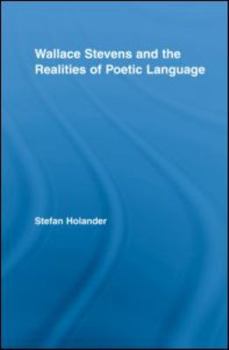Wallace Stevens and the Realities of Poetic Language
Select Format
Select Condition 
Book Overview
This study examines Wallace Stevens' ideas and practice of poetic language with a focus on the 1930s, an era in which Stevens persistently thematized a keenly felt pressure for the possible social involvement and political utility of poetic language. The argument suggests how mutually implicated elements of his poetry such as diction, prosody and metaphor are relied on to signify or enact aesthetic closure; both in the negative terms of expressive...
Format:Hardcover
Language:English
ISBN:0415955963
ISBN13:9780415955966
Release Date:February 2008
Publisher:Routledge
Length:248 Pages
Weight:1.04 lbs.
Dimensions:0.7" x 6.3" x 9.3"
Customer Reviews
0 rating





